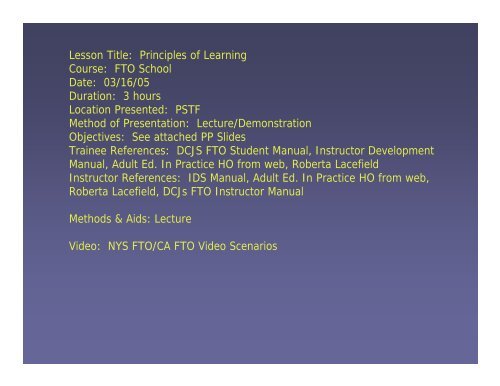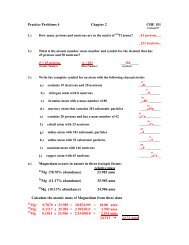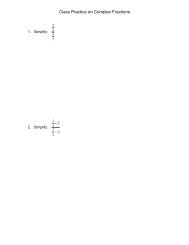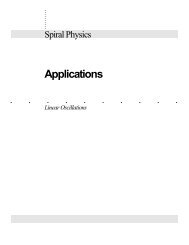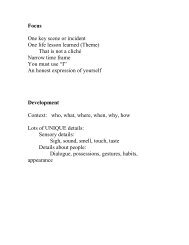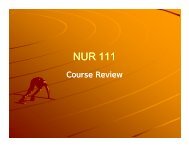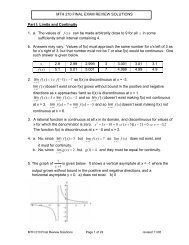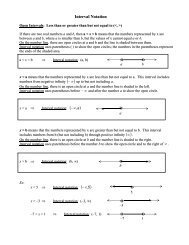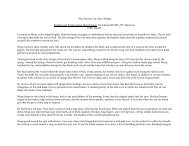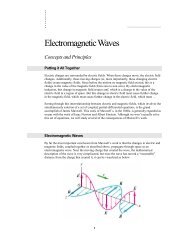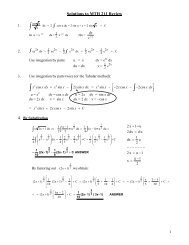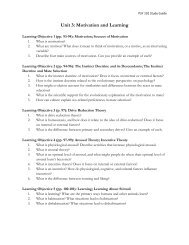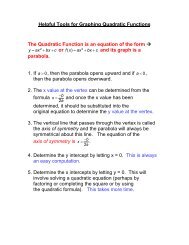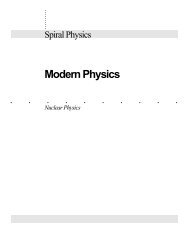FTO Principles of Adult Learning - Monroe Community College
FTO Principles of Adult Learning - Monroe Community College
FTO Principles of Adult Learning - Monroe Community College
Create successful ePaper yourself
Turn your PDF publications into a flip-book with our unique Google optimized e-Paper software.
Lesson Title: <strong>Principles</strong> <strong>of</strong> <strong>Learning</strong><br />
Course: <strong>FTO</strong> School<br />
Date: 03/16/05<br />
Duration: 3 hours<br />
Location Presented: PSTF<br />
Method <strong>of</strong> Presentation: Lecture/Demonstration<br />
Objectives: See attached PP Slides<br />
Trainee References: DCJS <strong>FTO</strong> Student Manual, Instructor Development<br />
Manual, <strong>Adult</strong> Ed. In Practice HO from web, Roberta Lacefield<br />
Instructor References: IDS Manual, <strong>Adult</strong> Ed. In Practice HO from web,<br />
Roberta Lacefield, DCJs <strong>FTO</strong> Instructor Manual<br />
Methods & Aids: Lecture<br />
Video: NYS <strong>FTO</strong>/CA <strong>FTO</strong> Video Scenarios
Field Training Officer<br />
School<br />
<strong>Principles</strong> <strong>of</strong> <strong>Adult</strong> <strong>Learning</strong><br />
Guy Rossi, PSTF Staff<br />
Daria Bour, MC Probation
Introduction<br />
• <strong>FTO</strong> in each police<br />
department worked,<br />
Fairport, Irondequoit and<br />
RPD.<br />
• <strong>FTO</strong> Administrator for<br />
RPD<br />
• Recruit Class<br />
Administrator RPD<br />
• Developer <strong>of</strong> the<br />
Mentor Program<br />
• Have instructed nationally<br />
at NA<strong>FTO</strong><br />
• Charter member <strong>of</strong><br />
ASLET<br />
• Instructor at Training<br />
Center since 1982<br />
• Retired RPD 8/98<br />
• Developer <strong>of</strong> DT Program<br />
since 1982<br />
• BS in Instructional Design<br />
• MS <strong>Adult</strong> Education
Objectives<br />
At the conclusion <strong>of</strong> this module <strong>of</strong> training<br />
the adult learner will be able to orally or in<br />
writing:<br />
1. Define the term “learning”.<br />
2. List the difference between adult and<br />
child learning.<br />
3. Compare and define multiple styles <strong>of</strong><br />
learning.
4.<br />
Objectives<br />
4. List methods to determining<br />
5.<br />
learning styles<br />
5. Define the Eight Laws <strong>of</strong><br />
6.<br />
<strong>Learning</strong>.<br />
6. List factors that impact the<br />
7.<br />
learning process.<br />
7. Give examples <strong>of</strong> how motivation<br />
affects learning.
Child and <strong>Adult</strong><br />
<strong>Learning</strong><br />
• <strong>Adult</strong>s are<br />
independent -<br />
Children are<br />
dependent.<br />
• <strong>Adult</strong>s are<br />
experienced -<br />
Children are<br />
inexperienced.<br />
Objective 2
What is “<strong>Learning</strong>”?<br />
• <strong>Learning</strong> is the gaining <strong>of</strong> knowledge or<br />
skill by study, scholarship, teaching, or<br />
discovery.<br />
• <strong>Learning</strong> is an observable, sustained<br />
change <strong>of</strong> behavior.<br />
Objective 1
Child and <strong>Adult</strong> <strong>Learning</strong><br />
• <strong>Adult</strong>s are internally<br />
motivated - Children<br />
are externally<br />
motivated.<br />
• <strong>Adult</strong>s want to<br />
know “what’s s in it<br />
for me” - Children<br />
don’t t worry about it.<br />
The F.T.O. must<br />
remember the<br />
recruit is an adult.<br />
Objective 2
Multiple <strong>Learning</strong> Styles<br />
Some learn best<br />
by:<br />
• Saying, hearing,<br />
and seeing<br />
words.<br />
• Categorizing,<br />
classifying, and<br />
observing things.<br />
Objective 3
Multiple <strong>Learning</strong> Styles<br />
Some learn best<br />
by:<br />
• Thinking, logically<br />
analyzing ideas and<br />
situations.<br />
• Doing, processing<br />
knowledge through<br />
physical experiences.<br />
• Relating to people,<br />
comparing,<br />
cooperating, and<br />
interviewing.<br />
Objective 3
Categorized <strong>Learning</strong><br />
Styles<br />
• Visual<br />
• Auditory<br />
• Tactile
Visual Learner<br />
• This type <strong>of</strong> person learns best by:<br />
• Seeing words, observing the actions <strong>of</strong><br />
others.<br />
• Mentally visualizing a scenario or<br />
procedure.<br />
• This person will use life experiences and<br />
reflect observations in the learning<br />
process.
Auditory Learner<br />
This persons learns best by:<br />
• Hearing instructions rather than<br />
reading.<br />
• Good at assimilating and processing<br />
through hearing instructional<br />
objectives and auditory commands.
Tactile Learner<br />
• This persons<br />
learns best by:<br />
• Doing, hands-<br />
on instruction<br />
serves this<br />
person best.
Ways to Determine Styles<br />
• What types <strong>of</strong><br />
activities do they<br />
enjoy most?<br />
• Consult with prior<br />
phase F.T.O. and<br />
administrator.<br />
• Consult Academy<br />
Staff.<br />
Objective 4
Purpose <strong>of</strong> Education<br />
• The discovery <strong>of</strong> new knowledge.<br />
• The dissemination <strong>of</strong> existing<br />
knowledge.<br />
• The translation <strong>of</strong> facts and knowledge<br />
into a practical application <strong>of</strong> action on<br />
the part <strong>of</strong> the student.
Eight Laws <strong>of</strong><br />
<strong>Learning</strong><br />
• Motivation<br />
• Reward<br />
• Readiness<br />
• Meaningfulness<br />
• Association<br />
• Simplicity<br />
• Feedback<br />
• Exercise<br />
Objective 5
Law <strong>of</strong> Motivation<br />
• Student must have the desire to<br />
learn.<br />
Q: What are some factors that can<br />
influence a student’s s desire to learn?<br />
• You need to motivate them.<br />
• Know your recruit!<br />
Q: What are some <strong>of</strong> the ways to get<br />
to know them?
Law <strong>of</strong> Reward<br />
• Practice “Unconditional Positive<br />
Regard”<br />
• Learn better if there is a reward.<br />
• Always give positive reward when the<br />
student responds to training.<br />
• Don’t t berate the student.<br />
• Try to end the night on a positive note.
Law <strong>of</strong> Readiness<br />
• The student learns best and fastest<br />
when they are prepared to learn.<br />
• Mentally ready!<br />
• Topic is important and they are<br />
enthusiastic.
Law <strong>of</strong> Meaningfulness<br />
• Must relate topic to the job.<br />
• <strong>Adult</strong>s learn best when the knowledge has<br />
meaning<br />
• Through experience<br />
• How does the training benefit them in<br />
relation to the job.<br />
• Don’t t give meaningless tasks.
Law <strong>of</strong> Association<br />
• <strong>Learning</strong> is easier<br />
when the student<br />
can associate what<br />
they are learning to<br />
what is already<br />
familiar to them.<br />
Other than laws and departmental<br />
procedures is our job any different<br />
anywhere in the world?
Law <strong>of</strong> Simplicity<br />
• Most <strong>of</strong> the time students learn better<br />
when the instruction is given in an<br />
orderly manner, one step at a time,<br />
rather than all at once.<br />
• Break tasks into sub-skills<br />
skills<br />
• Some learners need to see the end<br />
result to understand why they are<br />
learning the steps.
Law <strong>of</strong> Feedback<br />
• Students need to know<br />
if they are doing it right.<br />
Training…we didn’t<br />
have any training!<br />
When I came on all<br />
they gave me was a<br />
badge and a gun. It<br />
was me by myself<br />
protecting the city and<br />
by golly…<br />
• Don’t t wait until the end<br />
<strong>of</strong> the scenario or the<br />
end <strong>of</strong> the night to give<br />
negative feedback.<br />
• Give positive feedback<br />
when earned!<br />
Col. Lamar Cousins
Law <strong>of</strong> Exercise<br />
• Repetition means building habit patterns.<br />
• Correct habit patterns usually lead to<br />
success.<br />
• Use and repetition <strong>of</strong> a response<br />
strengthens it.<br />
• Failure to use weakens it.
Why is this Helpful?<br />
• The eight “Laws <strong>of</strong> <strong>Learning</strong>” provide<br />
an overview <strong>of</strong> what motivates people<br />
to learn.<br />
• An experienced trainer will use these<br />
“laws” to their advantage when<br />
charged with training new personnel.
Intelligence<br />
Instructor<br />
Factors<br />
Factors<br />
That<br />
Influence<br />
Training<br />
Methods <strong>of</strong><br />
Instruction<br />
<strong>Learning</strong><br />
Environment<br />
Student<br />
Factors<br />
Objective 6
<strong>Learning</strong> Environment<br />
• The F.T.O. is<br />
obligated to<br />
provide an<br />
environment<br />
where<br />
learning can<br />
occur.<br />
Factors
<strong>Learning</strong> Environment Factors<br />
• An efficient learning<br />
environment will be<br />
situational to what<br />
is being taught,<br />
such as:<br />
Firing range,<br />
patrol unit,<br />
and/or<br />
classroom
<strong>Learning</strong> Environment Factors<br />
• Considerations <strong>of</strong><br />
an efficient learning<br />
environment would<br />
be:<br />
• Recruit comfort,<br />
adequate equipment,<br />
and sufficient<br />
supplies.
Instructor Factors<br />
• Personal Qualities<br />
• Personal appearance and<br />
hygiene.<br />
• Leadership and courtesy.<br />
• Tact, , attitude and enthusiasm.<br />
• Communication Skills<br />
• Non-verbal communication,<br />
appropriate language,<br />
grammar, pronunciation, and<br />
the ability to develop rapport.
Instructor Factors<br />
(continued)<br />
• Knowledge <strong>of</strong><br />
Subject Matter<br />
• Preparation<br />
• Pr<strong>of</strong>essionalism<br />
• Instructor / Trainee<br />
interaction
• Physiological<br />
Student Factors<br />
• Amount <strong>of</strong> sleep<br />
• Must determine what is<br />
causing this!<br />
• Diet and nutrition<br />
• Psychological<br />
• Stress / emotional state<br />
<strong>of</strong> the student<br />
• Self confidence / well<br />
being
• Experience<br />
Student Factors (continued)<br />
• Prior knowledge and<br />
training.<br />
• This could be good and bad.<br />
• Additional issues based<br />
on:<br />
• Gender differences<br />
• Social differences<br />
• Cultural diversity<br />
• ADA issues<br />
• Educational differences
Environmental Factors<br />
• Temperatures<br />
• Lighting<br />
• Sound quality<br />
• Distractions
Methods <strong>of</strong> Instruction<br />
Factors<br />
• Role plays and demonstrations.<br />
• Practice and drills.<br />
• Questions and answer.<br />
• Calls for service.<br />
• “Every call is training opportunity”
How Motivation Effects<br />
<strong>Learning</strong><br />
• Motivation’s s effect on learning is very<br />
strong and potent.<br />
• Students must be motivated before<br />
they can or will learn.<br />
• Teaching/training tends to be most<br />
effective when the learner is “properly”<br />
motivated.<br />
Objective 7
“<strong>Learning</strong> Plateau”<br />
Defined:<br />
A place<br />
where<br />
learning has<br />
stopped or<br />
was left <strong>of</strong>f.
“<strong>Learning</strong> Plateau”<br />
• Factors that may cause/influence<br />
learning plateaus:<br />
• Fatigue, boredom, distractions, too much<br />
information too fast, fading interest, and<br />
saturation.<br />
• Possible solution:<br />
• Break the tension, change the method <strong>of</strong><br />
instruction. Is it the instructor?
Conditions That Facilitate<br />
<strong>Adult</strong> <strong>Learning</strong><br />
• Show why the material is important.<br />
• Strive for learner involvement.<br />
• Vary the instructional methods and<br />
activities.<br />
• Help manage the learner’s s experience.<br />
• Guide and reinforce the learner.<br />
• Provide enough time for the learner to<br />
learn.
Objectives<br />
At the conclusion <strong>of</strong> this module <strong>of</strong> training<br />
the adult learner will be able to orally or in<br />
writing:<br />
1. Define the term “learning”.<br />
2. List the difference between adult and<br />
child learning.<br />
3. Compare and define multiple styles <strong>of</strong><br />
learning.
4.<br />
Objectives<br />
4. List methods to determining<br />
5.<br />
learning styles<br />
5. Define the Eight Laws <strong>of</strong><br />
6.<br />
<strong>Learning</strong>.<br />
6. List factors that impact the<br />
7.<br />
learning process.<br />
7. Give examples <strong>of</strong> how motivation<br />
affects learning.


